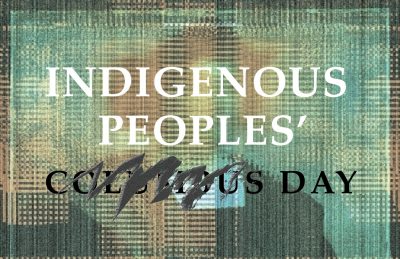In 1492, Christopher Columbus sailed the ocean blue. He then subsequently became one of the most polarizing figures in all of history.
With Columbus Day approaching Monday, now seems to be the best time to examine the mythology of Columbus, the impact he and his voyages had and the wide-ranging truths and lies associated with the explorer.
The classic story describes Columbus as an Italian explorer who convinced the crown of Spain to fund his daring expedition to find a new trading route to the Far East, bringing unspeakable wealth to himself and Spain, and proving that the Earth is round in the process.
After landing in what he believed to be India, he began trading with the locals, whom he called Indians. It was soon realized that Columbus was in fact not in India, but an entirely new part of the world. The rest is, well, history.
This story of Columbus, however, is bleak at best, and is riddled with errors — a common theme when recounting history. So, let’s take a look instead at the real history of Columbus and his voyages.

Christopher Columbus’ believed birthplace is Genoa, Italy. However, the Italy we know did not come into being until 1861, and Columbus was born in 1451. Columbus considered himself more Genoese than Italian, and given Genoa’s close contact with parts of Spain, his nationality is tricky.
As a teenager, Columbus participated in several voyages. But in 1476, French privateers attacked the ship he was on and sank it, which drove Columbus to swim to shore in Lisbon, Portugal. It was there that Columbus developed his skills as an explorer.
However, more important than the events that directly affected Columbus during this time were the events happening around the world, which ultimately led to his first Atlantic voyage.
The fall of Constantinople in 1453 threatened trade routes between the Far East and Western Europe. The Portuguese had established several trade routes by going around the Southern tip of Africa, which gave them a monopoly on trade with Eastern Asia.
At the end of Catholic Spain’s “Reconquista,” or expulsion of Jews and Muslims, it turned its sights toward exploration and colonization.
Columbus went to the Spanish crown with his idea of sailing west for Asia in 1486, but was initially rejected. However, Spain’s newfound hunger for exploration drove the monarchs to call him back, and on Aug. 3, 1492, Columbus set sail westward.
Two months later, Columbus landed on one of the islands in the Bahamas, though he had bounced around to several different islands. Before returning to Spain, he established a semi-permanent settlement and left several men on the island of Hispaniola — now Haiti and the Dominican Republic — home to the native Taino people.
Columbus was made governor of Hispaniola. But upon his return, he found the settlement destroyed and abandoned. He left his men, enslaved Indigenous peoples, as well as his brothers Bartolomeo and Diego, to rebuild it while he sailed west in search of gold. He then returned to Spain with various goods and about 500 enslaved native people.
Columbus made two other voyages, but conditions on Hispaniola had deteriorated so badly that he was stripped of his governorship, and was at one point even arrested and tried. Despite being found innocent, Columbus’ nobility was revoked, and he later died in 1506.
While several truths do arise from Columbus’ story, the more detailed a historical recount is, the more questions — and inaccuracies — arise.
What should be considered, perhaps even more so than the declarative history of Columbus, is the contemporary relationship between us and him.
Since June of this year, more than 30 Columbus statues have been taken down across the United States. Many cities and states are also changing the name of Columbus Day to Indigenous Peoples’ Day.
Immortalizing a man who never actually set foot in this country does seem rather silly, but just how much slander does Columbus really deserve? Was he a monster with pure evil in his heart, or is there more to this story?
Many say that judging those of the past by today’s moral standards is an ethical fallacy, but this has also been countered by saying that current spotlights, such as statues, are meant to reflect current morality.
It is interesting to consider, first, how moral Columbus was relative to his time, and second, whether we should idolize people who have become, by today’s standards, immoral. However, that is not the topic I find the most interesting in regard to Columbus.
Instead, it is interesting to instead think of Columbus the man as opposed to Columbus the legacy.
Columbus was an objectively good navigator and sailor, as well as an objectively bad governor — he has the blood of thousands of Taino people, as well as colonists, on his hands. However, the legacy of disease, senseless killing and genocide that has affected native people across the Americas cannot be simply chalked up to Columbus.
We have a tendency to consider large effects as having had large causes. It seems impossible that John F. Kennedy was simply assassinated — a word, by the way, we reserve for the killing of “important” people — or that the coronavirus could simply have been contracted unknowingly.
The same goes for Columbus. The domination of native people in the Americas is one of the saddest stories in human history, and it seems wrong that the person who kickstarted the colonization of two entire continents could not have had a profound impact on this tragic development.
But the U.S. government has done many more objectively worse things to native people than Columbus, and the only direct relation we have as a country with him is a day off in October.
It is easier to look at a central, individual cause as being responsible for the enormous impact that followed it, but this viewpoint dissolves responsibility from other entities that had a much more profound effect on that impact.
Centralizing blame on Columbus for all of the terrible things that came in his wake shifts accountability away from whole governments of people who have, and continue to, commit error.
We must remember that Columbus was a man, no more and no less.





Joel. Thanks for the informative article! Peace Al